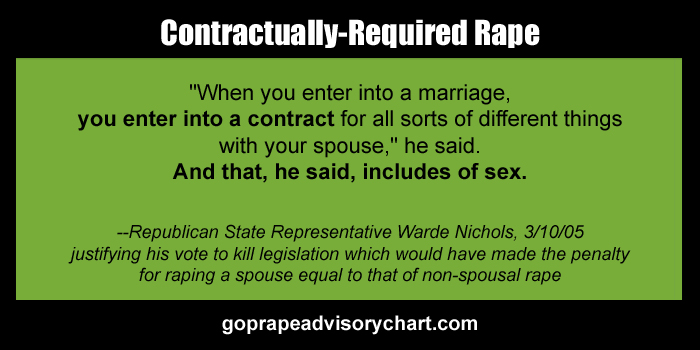Contractually-Required Rape
State:
Legislators kill spousal rape bill
PHOENIX — Four Republicans united Thursday to kill legislation to say that the penalty for raping a spouse should be the same as assaulting anyone else.
The vote of the House Committee on Human Services came after foes said they feared boosting the penalty would provide incentives for a wife to charge rape.
"That's going to be much more likely to happen in a scenario where two people are normally having sexual relations and then, if one person decides for whatever reason that they would like to attack the other person this is a very serious way to get it done," said Rep. Mark Anderson, R-Mesa.
There also were questions of whether it is appropriate to have the penalty for rape — up to 15 years in prison — apply when the attacker and victim are married.
Now the maximum sentence for spousal rape is 18 months in prison. The law also permits a judge to treat it as a misdemeanor and order the husband to participate in family counseling.
SB 1040, which gained Senate approval on a 29-1 vote, would eliminate any disparity.
Rep. John Allen, R-Phoenix, said a stiffer sentence for spousal rape is unnecessary. He said a prosecutor can levy other charges if appropriate, like assault and unlawful imprisonment.
And Rep. Warde Nichols, R-Gilbert, said he feared the legislation would undermine the whole concept of marriage.
"When you enter into a marriage, you enter into a contract for all sorts of different things with your spouse," he said. And that, he said, includes of sex.
Nichols said those benefits "need to be eliminated" if someone is getting a divorce. But short of that, he said it is wrong to impose this kind of penalty when a wife charges rape.
"Why should we take it to a Class 2 felony and put a husband away who's been a good husband for however many years … based off of something that was OK in a marriage up until that point?"
Rep. David Bradley, D-Tucson, said fears of false reporting make no sense.
"You have two situations where the facts of the case were the same," he said, but in one the victim is the wife. Bradley said that, given the marriage — and any sexual history — "the burden of proof would be higher for that married couple than it would be for the other."
Allen said a wife might believe that charging her spouse with a major felony might improve her position in dividing up community property, getting child support and even getting custody of the children.
Bradley said prosecutors, not wives, decide whether to bring charges. He said those decisions are based on the facts of the situation and the chances of convincing a jury to convict.
But Bradley ended up in the minority, as Rep. Laura Knaperek, R-Tempe, also voted to kill the measure.


